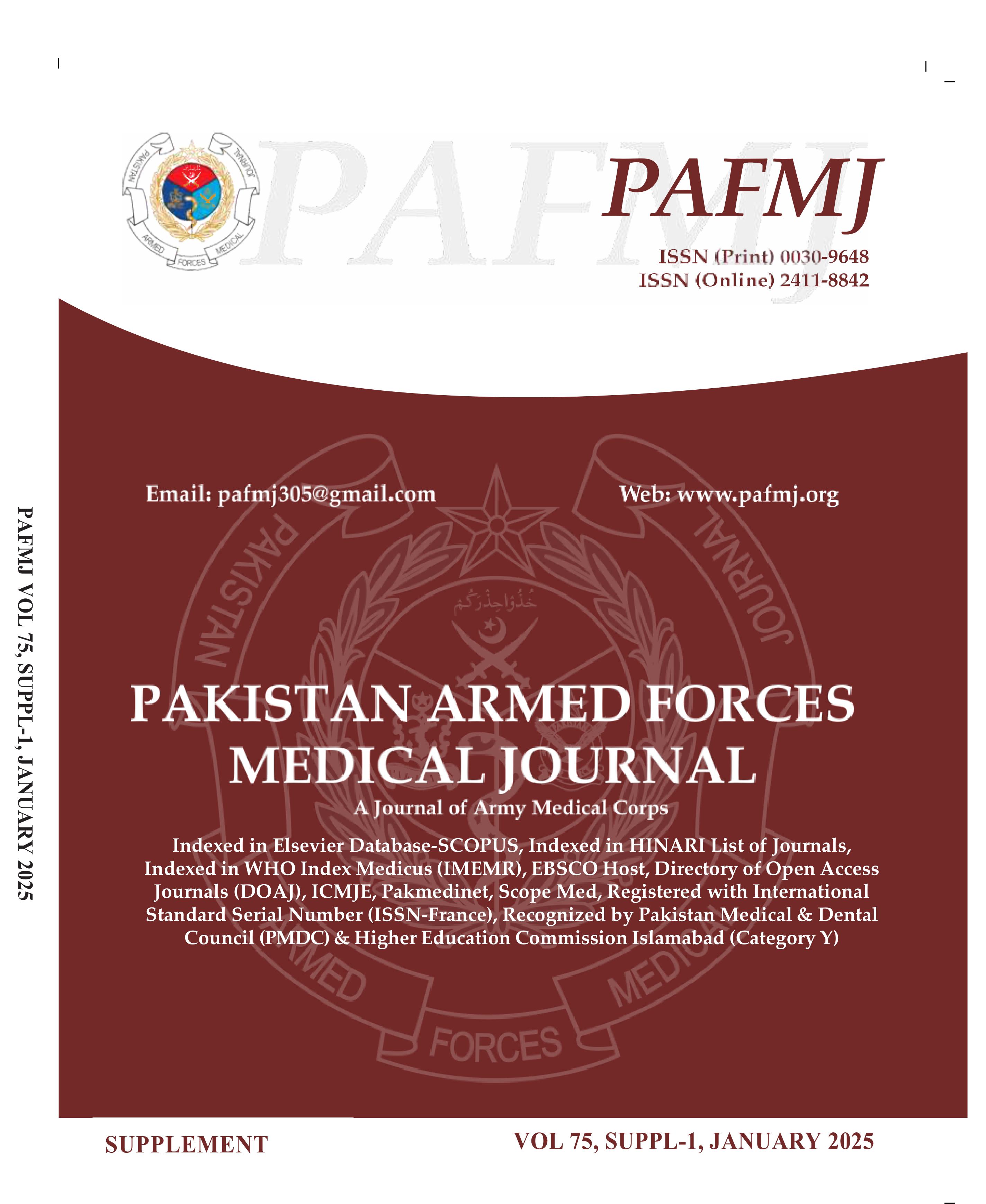Comparison of Efficacy of Intralesional Metronidazole Versus Intralesional Meglumine Antimoniate in Patients of Cutaneous Leishmaniasis
DOI:
https://doi.org/10.51253/pafmj.v75iSUPPL-1.7417Keywords:
Cutaneous leishmaniasis, Metronidazole, Meglumine antimoniate, Intralesional therapy..Abstract
Objective: To compare the effectiveness of intralesional Metronidazole versus intralesional Meglumine antimoniate in the treatment of cutaneous leishmaniasis.
Study Design: Quasi experimental study.
Place and Duration Of Study: Department of Dermatology, Combined Military Hospital, Peshawar Pakistan, from Dec 2019 to June 2020.
Methodology: After informed consent from study participants and approval from the hospital ethical committee, sixty patients with cutaneous leishmaniasis from the dermatology OPD who met the inclusion criteria were chosen. Patients were randomly assigned to one of two therapy groups using simple randomization. Group A was given intralesional Metronidazole 1-2 ml (5-10mg) per lesion twice a week and Group B received intralesional Meglumine antimoniate 1-2 ml (90-180mg) per lesion twice a week for 8 weeks. Lesions were measured using a ruler and palpation to determine their size and induration. Patients were followed up till their treatment was completed. The drug was considered efficacious if there was 75 percent reduction in size or induration of lesion.
Results: At the end of eight weeks, clinical effectiveness was observed in 16(53.33%) patients in Group A and 28(93.33%) patients in Group B. The results were found to be statistically significant with a p-value of 0.001.
Conclusion: Intralesional Meglumine antimoniate is more effective than intralesional Metronidazole in the treatment of cutaneous leishmaniasis.
Downloads
References
cutaneous leishmaniasis during 2009 -2016 in Kashan city, central Iran. Korean J Paras. 2018; 56(1): 21-24.
Alvar J, Vélez ID, Bern C, Herrero M, Desjeux P,Cano J et al. Leishmaniasis worldwide and global estimates of Its Incidence. PLoS ONE. 2012; 7(5): e35671.
Bari AU. Clinical spectrum of cutaneous leishmaniasis. An overview from Pakistan. Dermatol Online J. 2012; 18(2): 4.
Ayaz MM, Nazir MM, Najeeb Ullah, Aqir Z, Akbar A, Zeeshan M et al. Cutaneous leishmaniasis in the metropolitan city of Multan, Pakistan, A neglected tropical disease. J Med Entomol. 2018 ; 55(4): 1040-42.
Kassi M, Kassi M, Afghan AK, Rehman R, Kasi PM. Marring leishmaniasis: the stigmatization and the impact of cutaneous leishmaniasis in Pakistan and Afghanistan. PLoS Negl Trop Dis. 2008 October; 2(10): e259.
Aronson N, Herwaldt BL, Libman M, Pearson R, Lopez- Velez R, Weina P, et al. Guidelines, diagnosis and treatment of leishmaniasis: Clinical practice guidelines by the Infectious Diseases Society of America (IDSA) and the American Society of Tropical Medicine and Hygiene (ASTMH). Am J Trop Med Hyg. 2017; 96(1): 24-45.
Khattak JI, Ullah G, Uddin Khan CO. Efficacy of combined parenteral meglumine antimoniate and oral allopurinol with meglumine antimoniate alone in the treatment of cutaneous leishmania. J Pak Assoc Dermatol. 2020; 30(4): 649-54.
Tahir M, Bashir U, Ahmed N, Mumtaz J. Electrocardiographic changes with standard dose of Meglumine Antimoniate therapy in cutaneous leishmaniasis. Pak Armed Forces Med J. 2021; 71(4): 1235-38.
Aronson NF, Joya CA. Cutaneous leishmaniasis: Update in diagnosis and management. Infect Dis Clin North Am 2019; 33(1): 110-17.
Al Hassnawi HH, Al Saeed MS, Al Yassari HF, Al Qaysi SI. The use of intralesional metronidazole in the treatment of cutaneous leishmania. Med J Babylon. 2006; 3(4):260-4.
Mapar MA, Omidian M. Intralesional injection of metronidazole versus meglumine antimoniate for the treatment of cutaneous leishmaniasis. JundishapurJ Microbiol. 2010; 3(2): 79-83.
Moreira VR, DeJesus LCL, Soares RP, Silva LDM, Pinto BAS, Melo MN et al. Meglumine antimoniate (Glucantime) causes oxidative stress derived DNA damage in BALB / c mice infected by Leishmania (Leishmania infantum). Antimicrob Agent Chemother. 2017; 61(6): e02360-16.
Fozongari F, Dalimi A, Arab SS, Behmanesh M, Khammari A. Trypanothione Reductase Gene Mutations in Meglumine Antimoniate Resistant Isolates from Cutaneous Leishmaniasis Patients Using Molecular Dynamics Method. Iran J Parasitol. 2020 ;15(4):511-520.
Siddique MAB, Hussain MI. ECG changes in patient of visceral leishmaniasis (Kala azar) receiving Sodium stibogluconate therapy. Faridpur Med Coll J 2018 ; 13(2) :70-73.
Al-Waiz M, Sharquie KE, Al-Assir M. Treatment of cutaneous leishmaniasis by intralesional metronidazole. Saudi Med. J 2004; 25(10):1512-3.
Kellapatha IP, Wijesinghe WA, Ranatunga RA, Athapathu W, Bandara M, Sumanasena JA, et al. Randomized double-blind study on the efficacy of intralesional metronidazole versus intralesional sodium stibogluconate in cutaneous leishmaniasis. Anuradhapura Med J. 2015; 9(2 Supp): S03.
Somaratne VN, Ranawaka RR, Javarowan HM, Wipuladasa DM, Padmal SH. Randomized double-blind study on intralesional metronidazole versus sodium stibogluconate in Leishmania donovani cutaneous leishmaniasis. J Dermatolog Treat.2019; 30(1): 87-91.
Bahnan BA, Shabu SA, Sleman SA. Intralesional pentostam versus intralesional metronidazole in treating cutaneous leishmaniasis; A comparative study. Zanco J Med Sci. 2019; 23(2): 257-63
Downloads
Published
Issue
Section
License
Copyright (c) 2025 Raisa Khan Gul, Sameena Kausar, Tehseen Naveed, Sumyra Saleem, Sarah Riaz, Ghazala Said

This work is licensed under a Creative Commons Attribution-NonCommercial 4.0 International License.















